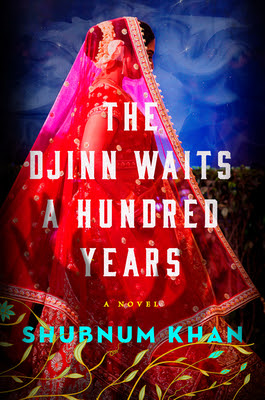by MK French
Once a grand estate off the coast of South Africa, Akbar Manzil is a derelict estate that now serves as a boarding house for misfits. Sana and her father are among the latest tenants, but she doesn't ignore the oddities of the house or the locked door at the end of the East Wing. Inside is a preserved bedroom where Meena, the original owner's second wife, had died a hundred years before. Unknown to Sana, a grieving djinn is also in the room. She's obsessed with Meena's story, and the djinn had loved her. Now the djinn follows Sana as she dredges up old secrets, unknowingly setting into motion events that will change the lives of all the current residents.
Amazon affiliate links are used on this site. A free book was provided for an honest review.
 |
| January 2024; Viking; 978-0593653456 audio, ebook, print (320 pages); historical fiction |
We have an omniscient narrator following around the residents in this boarding house, though Sana remains the primary one that we follow. We learn about Sana and the ghost of her twin, her father, their landlord Doctor, Pinky the housekeeper, and the other boarders Fancy, Razia Bibi, and Zuleika. They all feel abandoned and left behind by life, past miseries, and pains pushing them to live in an oddly shaped home cut apart into apartments with bad wiring and erratic piping, detritus from former tenants still littering rooms and hallways. Always alone, Sana is looking for what love is, how it affects people, and what leads to connections.
We also go through the past, with Jahanara Begum, her husband Akbar, and the marriage to Meena as his second wife. Jahanara is of appropriate caste and complexion for Akbar and his pushy, domineering mother, but his impulsive nature is drawn to Meena. Because she had been a sweeper on the factory floor, everyone in the household was against Meena from the start, even some of the servants. It's a stressful life, one that Sana gradually uncovers when she finds Meena's diaries. We see the hard life Meena had with more detail than Sana does, and at the end, it all clicks into place and we see the connections between some of the characters.
This novel has dual timelines that are very beautifully done. It shows the ways that class, color, and expectations can twist people into knots and that people can hurt each other even without meaning to. Love can bind people together in positive ways, but sometimes it leads to devastation when that love twists into fear and anger. It's ultimately a very melancholy story in the past, one that the characters in the present can learn from, even if it's only unconsciously.
Buy The Djinn Waits a Hundred Years at Amazon
Born and raised in New York City, M.K. French started writing stories when very young, dreaming of different worlds and places to visit. She always had an interest in folklore, fairy tales, and the macabre, which has definitely influenced her work. She currently lives in the Midwest with her husband, three young children, and a golden retriever.
Enjoyed this post? Never miss out on future posts by following us. Get even more book news in your inbox, sign up for our newsletter today! Or Follow Girl Who Reads with Bloglovin. Girl Who Reads is an Amazon advertising affiliate; a small commission is earned when purchases are made at Amazon using any Amazon links on this site. Thank you for supporting Girl Who Reads.









.png)









0 comments:
Post a Comment